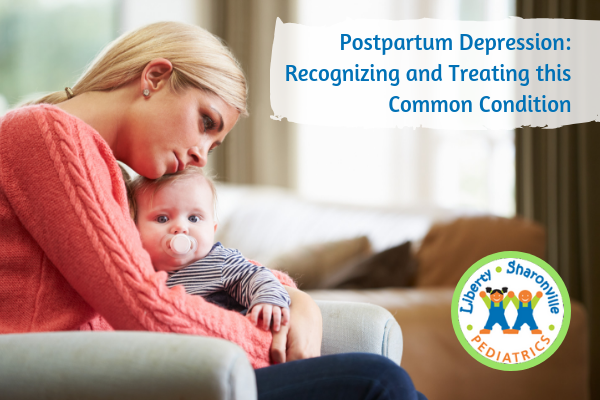From Chrissy Teigen to Gwyneth Paltrow, celebrities are opening up about their experiences with Postpartum Depression (PPD). PPD is more common than most realize, occurring in an estimated 1 in 5 mothers. The American Academy of Pediatrics has defined PPD as “the most under-diagnosed obstetric complication in America”. Not only does PPD affect mom’s health, but it can also have a significant impact on the entire family. Because the effects of PPD can be so devastating, it is important to arm ourselves with the ability to recognize this common condition. With this knowledge, multiple lives can be saved.
What is Postpartum Depression?
Postpartum Depression is often confused with the more common condition of “Post-Baby Blues”. This collection of depressive symptoms occurs in 50-80% of mothers within the first few days of delivery. Symptoms include crying, worrying, sadness, and anxiety (thank you hormones!), and resolve within days to a few weeks. In contrast, true PPD does not resolve so quickly, and symptoms may not be present until up to six months after giving birth. Most moms develop symptoms around six weeks postpartum, and another subset at 2-3 months. Symptoms are similar to the “Blues”, including increased tearfulness, anxiousness, and withdrawal from baby or other family members. Some mothers can even present with psychotic symptoms, including paranoia, hallucinations, and suicidal or homicidal thoughts. Postpartum Psychosis is a very serious disorder that requires medical attention immediately.
How Does PPD Affect My Baby?
The bond that exists between a mother and her baby is an important factor in that child’s development. Neglected infants have even been found to have adverse changes on MRI, as compared to those infants living in a nurturing environment. Consequences include behavior problems and cognitive, language, and social-emotional delays. PPD has also been shown to contribute to the early cessation of breastfeeding and poor maternal judgment, leading to an increased number of accidents.
How can I help my loved one suffering from Postpartum Depression?
Every mother should be screened for PPD at her six-week postpartum appointment with her OB/GYN. As pediatricians, we are also attempting to increase awareness and screening, since we see moms much more often than their OB does. If you think someone close to you is suffering from this disorder, you should make sure they know these three things:
- You are not alone! There are other mothers out there feeling the same exact way.
- You are not to blame. This is not your fault, and this does not make you a bad mother.
- Things will get better. It will take time, but with patience and the appropriate treatment, you will feel better.
If there is a concern for PPD, it should be addressed immediately. Affected mothers should seek help from their OB/GYN or their primary care provider. From there, they can be provided the appropriate treatment or referred to a mental health specialist, as necessary. If any symptoms of Postpartum Psychosis or suicidal/homicidal thoughts are present, please seek emergency help immediately. For additional support, you can reach the National Suicide Prevention Hotline at 1-800-273-8255.
References: “Clinical Report— Incorporating Recognition and Management of Perinatal and Postpartum Depression Into Pediatric Practice”, American Academy of Pediatrics
A special thank you to our guest author: B. Paige Phillips, M.D.

Dr. Phillips joined Liberty Sharonville Pediatrics in August 2018. There are many aspects of being a pediatrician that make Dr. Phillips thankful for her job every single day. Most of all, she is thankful for the trust that exists between herself, her patients, and their parents. It is such an honor to be involved in each child’s life and to watch them grow into the successful, well-rounded beings they are each meant to be.














